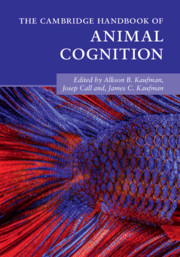Book contents
- The Cambridge Handbook of Animal Cognition
- The Cambridge Handbook of Animal Cognition
- Copyright page
- Dedication
- Contents
- Figures, Tables, and Boxes
- Contributors
- Acknowledgments
- Introduction
- Part I Communication and Language
- Part II Memory and Recall
- Part III Social Cognition
- 11 Social Cognition Overview
- 12 Proximate and Ultimate Mechanisms of Cooperation in Fishes
- 13 Evolutionary and Neural Bases of the Sense of Animacy
- 14 Raven Social Cognition and Behavior
- 15 Reciprocal cooperation – Norway rats (Rattus norvegicus) as an example
- 16 Exploring the Social Minds of Elephants
- 17 Dolphin Social Cognition
- 18 Mirror Self-Recognition
- Part IV Social Learning and Teaching
- Part V Numerical and Quantitative Abilities
- Part VI Innovation and Problem-Solving
- Index
- References
18 - Mirror Self-Recognition
Five Decades of Primate Research
from Part III - Social Cognition
Published online by Cambridge University Press: 01 July 2021
- The Cambridge Handbook of Animal Cognition
- The Cambridge Handbook of Animal Cognition
- Copyright page
- Dedication
- Contents
- Figures, Tables, and Boxes
- Contributors
- Acknowledgments
- Introduction
- Part I Communication and Language
- Part II Memory and Recall
- Part III Social Cognition
- 11 Social Cognition Overview
- 12 Proximate and Ultimate Mechanisms of Cooperation in Fishes
- 13 Evolutionary and Neural Bases of the Sense of Animacy
- 14 Raven Social Cognition and Behavior
- 15 Reciprocal cooperation – Norway rats (Rattus norvegicus) as an example
- 16 Exploring the Social Minds of Elephants
- 17 Dolphin Social Cognition
- 18 Mirror Self-Recognition
- Part IV Social Learning and Teaching
- Part V Numerical and Quantitative Abilities
- Part VI Innovation and Problem-Solving
- Index
- References
Summary
This chapter reviews five decades of research on reactions to mirrors and self-recognition in nonhuman primates, starting with Gallup’s (1970) pioneering experimental demonstration of self-recognition in chimpanzees and its apparent absence in monkeys. Taking a decade-by-decade approach, developments in the field are presented separately for great apes on the one hand, and all other primates on the other (prosimians, monkeys, and so-called lesser apes), considering both empirical studies and theoretical issues. The literature clearly shows that among nonhuman primates the most compelling evidence for something approaching human-like visual self-recognition is seen only in great apes, despite an impressive range of sometimes highly original procedures employed to study many monkey species. In the past decade, research has been shifting from simple questions about whether great apes can self-recognize (now considered beyond doubt), to addressing possible biological bases for individual and species differences in the strength of self-recognition, analysis of possible adaptive functions of the capacity for self-visualization, and searching for evidence of self-recognition in a range of nonprimate species.
- Type
- Chapter
- Information
- The Cambridge Handbook of Animal Cognition , pp. 415 - 440Publisher: Cambridge University PressPrint publication year: 2021

